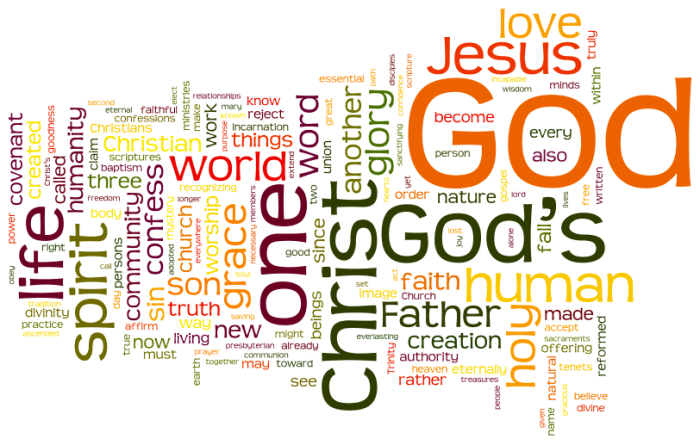The immediate goal of the Draft is to initiate theological discussions within the Fellowship of Presbyterians looking to reclaim its Reformed heritage as an essential step to forming a new Reformed body from the evangelical wing of the PC(USA). Its larger purpose is to foster discussions that will lead to a theological consensus and a spirit of theological friendship among those engaged in giving birth to this new Reformed body. Its perspective is thus evangelical and Reformed.
The Draft begins with a confession of failure on the part of the PC(USA). We have "severely weakened our worship and witness" by our "casual affirmation of our theological heritage." We are "squandering the gifts our confessional heritage could give us." The confession is an inclusive one, which is to say that the Draft recognizes that the evangelical wing of the denomination bears its own responsibility the sad state of the denomination's theological condition. The Draft proposes to address this situation by promoting discussion leading to a theological consensus among Pc(USA) evangelicals concerning the essentials of the Reformed faith. One of the main tasks of the new Reformed body that will emerge from the Fellowship is to foster this consensus. "Identifying essentials," according to the Draft, "necessarily and rightly focuses our theological conversation and our life together."
 |
| Wordle for the Theological Draft document |
The Draft's analysis of what is needful for reclaiming the future does not appear to be based on any empirical data. The decline of our churches is evident, but the causes are multiple and not clear. They are often at least partly local as demographic changes leave some churches high and dry while others benefit from being located in areas of growing population. It is not evident on the face of it that reclaiming a particular theological heritage will address actual causes of decline.
The Draft's analysis, furthermore, is built on the unstated assumption that liberalism is the primary cause of mainline church decline. Liberal churches decline whereas conservative ones don't. Evangelicals have long argued that in order to move forward, we must reclaim the classical doctrines and faith of the church. The authors of the Draft look to PC(USA)'s Book of Confessions as our treasury of classical Reformed faith and write, "The documents that compose The Book of Confessions are not seen in our rear view mirrors as road markers of where the church has been; they are seen through our windshield as faithful and sure guides for our perilous road ahead." The problem is that in our age of advancing secularity even the most conservative and faithfully evangelical churches are beginning to decline. The Southern Baptist Convention has in the last decade passed a tipping point and the pace of statistical decline is slowly accelerating. By the same token, evangelical megachurches are losing their momentum of growth and beginning to show indications that the boom times are coming to an end. Evangelical fervor, seriousness of purpose, and deep commitment to their churches has heretofore shielded many of their congregations as well as their denominations from the creeping secularity of our times. Creeping secularity is slowly rendering these traits ineffective. And, in any event, it is not at all clear that the theological orientation of evangelical churches in and of itself had much to do with their staying power down to the present. Their deep sense of conviction seems to have been much more important.
It seems, then, that the Fellowship of Presbyterians is charting its future course and putting its hope on an assumption that does not bear out in the real world of church decline. We are in a new age. It is secular in nature. Reclaiming our theological heritage will not ultimately address the challenge of secularity. This is not to say that theological literacy is unimportant. It is important, but it is not the key factor in decline. Large segments of the church have always been "theologically challenged" even in ages when the church grew almost automatically.
